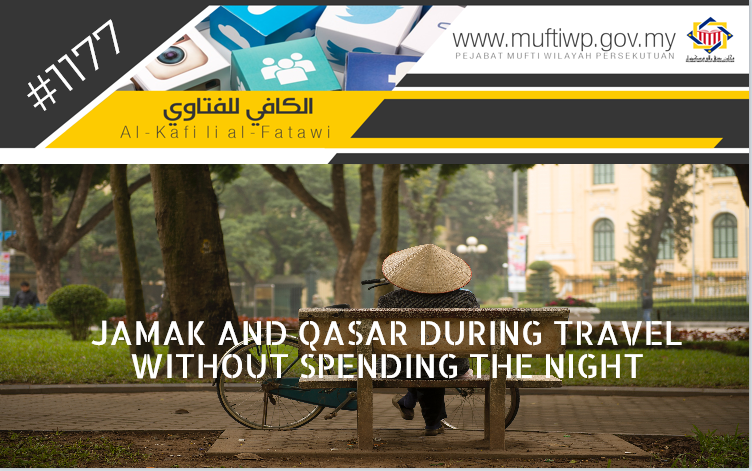Question:
Assalamualaikum Dr,
I’m going to send my kid back to his university in Alor Gajah from Subang Jaya where the distance for the travel exceed two marhalah and outside from my place of residence. Is it permissible for me to perform jamak for my prayer before I arrive at my house even if I don’t spend the night anywhere for my travel?
Answer:
Alhamdulillah, praise and thanks to Allah for the countless blessings He has blessed us all with. Blessings and salutations to the Prophet Muhammad PBUH, his wives, his family, companions and all those that follow his teachings to the day of judgement.
There are three valid conditions for prayers of a traveller, which means for jamak and qasar prayer:
- The distance for the travel must be at least 81 km. Hence, if the distance is less from this distance, then it is not considered. He must also not have the intention to stay for four days at the destination from the day he arrives and on the day he travels back. When he has the intention to stay for four days, the destination place is considered the same as his place of residence. Thus, it is impermissible for him to perform qasar prayer there but it is still permissible for him to perform qasar when he is travelling.
- A travel where the destination is certain. Hence, a person travelling without any specific destination in mind and the people who follow the leader without knowing where they are headed, then it is impermissible for them to perform qasar except when they have travelled a great distance. The reason is, only then the great distance is a certainty.
- The travel is not for sinful purposes. Thus, it Is not considered as a safar (travel) for those who are travelling to perform business transactions involving alcoholic beverages, usury or robbing. The reason is, qasar is a facilitation sanctioned in order to fulfil an obligation and should not be related to any sins.
Whereas, there is no valid conditions that state an obligation to stay overnight. Consequently, the syarak set the maximum time is three days excluding the day one arrives and the day one travels back. This is in accordance with a hadith from al-‘Ala bin al-Hadhrami RA, where the Prophet PBUH said:
ثَلاَثٌ لِلْمُهَاجِرِ بَعْدَ الصَّدَرِ
“It is only for three nights that a Muhajir should stay at Mecca after the completion of the rituals of Hajj.”
Sahih al-Bukhari (3933) and Sahih Muslim (1352)
Imam Abu Ishak al-Syirazi said before using the above hadith as evidence: “If a traveller has the intention to stay for four days excluding the day he arrives and leave, then he became a temporary resident (due to his intention), ending the rukhsah (facilitation) for the traveller, as for a traveller who has the intention to stay for three days, he is not considered as a resident.” Refer al-Majmu’ Syarh al-Muhadzdzab (4/359)
Regarding the evidence of jamak prayer when one is travelling, from Ibn Abbas R.anhuma, he said:
كَانَ رَسُولُ اللَّهِ صَلَّى اللهُ عَلَيْهِ وَسَلَّمَ يَجْمَعُ بَيْنَ صَلاَةِ الظُّهْرِ وَالْعَصْرِ إِذَا كَانَ عَلَى ظَهْرِ سَيْرٍ، وَيَجْمَعُ بَيْنَ الْمَغْرِبِ وَالْعِشَاءِ
“Allah's Messenger (ﷺ) used to offer the Zuhr and `Asr prayers together on journeys, and also used to offer the Maghrib and `Isha' prayers together.”
Sahih al-Bukhari (1056)
The next hadith is from Ibn Abbas R.anhuma:
أَنَّ النَّبِي صَلَّى اللهُ عَلَيْهِ وَسَلَّمَ جَمَعَ بَيْنَ الصَّلاَةِ فِى سَفْرَةٍ سَافَرْنَاهَا فِى غَزْوَةِ تَبُوكَ فَجَمَعَ بَيْنَ الظُّهْرِ وَالْعَصْرِ وَالْمَغْرِبِ وَالْعِشَاءِ قَالَ سَعِيدٌ بِنْ جُبَيْرٍ فَقُلْتُ لاِبْنِ عَبَّاسٍ: مَا حَمَلَهُ عَلَى ذَلِكَ؟ قَالَ: أَرَادَ أَنْ لاَ يُحْرِجَ أُمَّتَهُ
The Messenger of Allah (ﷺ) combined the prayers as he set on a journey in the expedition to Tabuk. He combined the noon prayer with the afternoon prayer and the sunset prayer with the 'Isha' prayer. Sa'id (one of the rawis) said to Ibn 'Abbas: “What prompted him to do this?” He said: “He wanted that his Ummah should not be put to (unnecessary) hardship.”
Sahih Muslim (705)
According to the above discussion, it is permissible for a person who travels to a destination of more than two marhalah to perform jamak and qasar, even if he travels without staying overnight. May this explanation benefit the questioner. Wallahua’lam.


